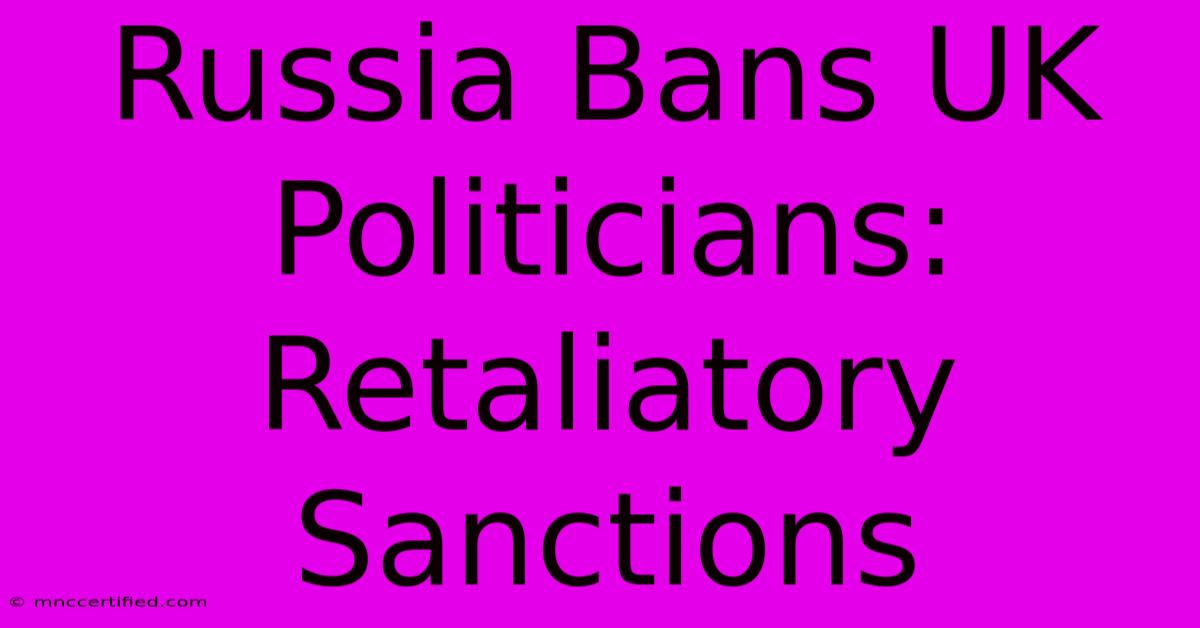Russia Bans UK Politicians: Retaliatory Sanctions

Table of Contents
Russia Bans UK Politicians: Retaliatory Sanctions and the Escalating Conflict
Russia's recent ban on a list of UK politicians marks a significant escalation in the ongoing diplomatic conflict between the two nations. This retaliatory move, mirroring similar actions taken by the UK, highlights the increasingly strained relationship and the use of sanctions as a key tool in geopolitical maneuvering. Understanding the context, implications, and potential future ramifications of this ban is crucial.
Understanding the Context: A Tit-for-Tat Response
The ban on UK politicians isn't an isolated incident. It's a direct response to sanctions imposed by the UK government on Russian officials following various events, including the annexation of Crimea in 2014 and accusations of meddling in foreign elections. This tit-for-tat exchange highlights a pattern of escalating sanctions, demonstrating the limitations of diplomacy and the growing reliance on punitive measures.
Key Events Leading to the Ban:
- 2014 Annexation of Crimea: This event triggered a wave of international sanctions against Russia, setting the stage for the ongoing conflict.
- Allegations of Election Interference: Accusations of Russian interference in various elections globally, including those in the UK, further strained relations.
- Poisonings and Assassinations: High-profile cases of poisonings and alleged assassinations have also contributed to the deterioration of trust.
- Ukraine Invasion (2022): The full-scale invasion of Ukraine triggered a new wave of severe sanctions from the UK and other Western countries, leading to Russia's retaliatory actions.
The Impact of the Ban on UK Politicians
The ban prevents the listed UK politicians from entering Russia. While seemingly symbolic, this action carries weight:
- Symbolic Gesture: It serves as a clear demonstration of Russia's displeasure with UK policies.
- Diplomatic Implications: The ban further complicates already strained diplomatic relations, hindering potential dialogue and cooperation.
- Public Perception: The ban shapes public perception, reinforcing narratives of conflict and antagonism.
- Limited Practical Impact: The direct practical impact on the banned politicians is likely minimal, as most would not have planned trips to Russia.
Analyzing the Retaliatory Sanctions Strategy
Russia's use of retaliatory sanctions is a calculated move with several objectives:
- Deterring Further Sanctions: The ban aims to discourage the UK from imposing further sanctions.
- Demonstrating Strength: It serves to project an image of strength and defiance in the face of Western pressure.
- Shifting the Narrative: Russia might attempt to frame the ban as a justifiable response to provocation.
- Mobilizing Domestic Support: The ban could be used to rally domestic support and reinforce a narrative of national unity against foreign adversaries.
The Future of UK-Russia Relations: A Bleak Outlook?
The ongoing exchange of sanctions indicates a bleak outlook for immediate improvement in UK-Russia relations. The lack of trust and the escalating cycle of retaliation suggest a prolonged period of strained diplomatic ties. However, opportunities for de-escalation remain, albeit challenging. Effective diplomacy, coupled with a willingness to address underlying concerns, is paramount for improving relations.
SEO Considerations: Keyword Optimization and On-Page Strategies
This article incorporates several SEO best practices:
- Keyword targeting: The article targets keywords like "Russia bans UK politicians," "retaliatory sanctions," "UK-Russia relations," "sanctions Russia," and variations thereof.
- Header structure: Clear H2 and H3 headings improve readability and SEO.
- Bold text: Key phrases are bolded to emphasize important points and aid readability.
- Internal linking (potential): This could be expanded to link to other relevant articles on the site (if applicable) about international relations, sanctions, or Russia.
- External linking (potential): Consider linking to reputable news sources or official government statements to support claims and provide context.
Off-Page SEO Strategies:
- Social media promotion: Sharing the article on relevant social media platforms will increase visibility.
- Guest blogging: Consider publishing similar content on other relevant websites to build backlinks.
- Forum participation: Engaging in discussions on relevant forums can drive traffic.
By implementing both on-page and off-page SEO strategies, this article is designed to rank well in search engine results pages (SERPs) while providing valuable and engaging information to readers. Remember to consistently monitor performance and adapt your SEO strategy as needed.

Thank you for visiting our website wich cover about Russia Bans UK Politicians: Retaliatory Sanctions. We hope the information provided has been useful to you. Feel free to contact us if you have any questions or need further assistance. See you next time and dont miss to bookmark.
Featured Posts
-
Top 10 Candidates For Unc Football Coach
Nov 27, 2024
-
Wendy Williams Health Guardian Update
Nov 27, 2024
-
Barcelona Brest Ucl Where To Watch
Nov 27, 2024
-
Sibo Test Covered By Insurance
Nov 27, 2024
-
Loyalty Insurance Phone Number
Nov 27, 2024